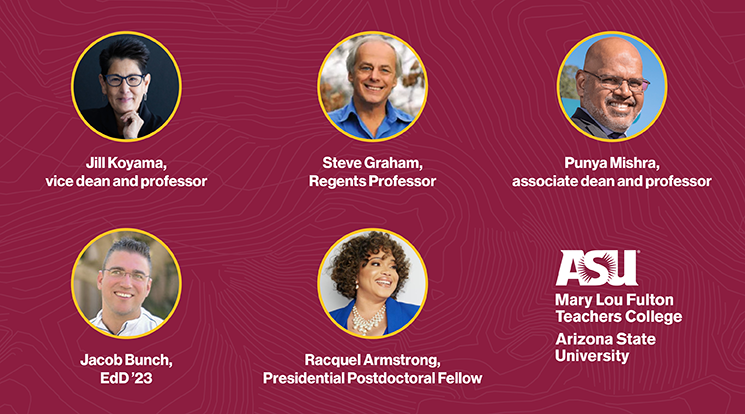Education researchers recognized at 2024 AERA meeting

More than 140 researchers from MLFTC and the wider ASU community participated in the American Educational Research Association meeting April 11–14 in Philadelphia. The annual event is the world's largest gathering of education researchers and a showcase for groundbreaking, innovative studies in an array of areas. The event also provided an opportunity to recognize the impact of researchers in their field of study, and special recognitions went to five MLFTC-affiliated individuals.
Jill Koyama, a professor and the vice dean for educational leadership and innovation, received the AERA Division G (Social Context of Education) Mentoring Award (2024). Koyama is a cultural anthropologist whose research and leadership are informed by her commitment to inclusive excellence. Koyama is Co-Editor-In-Chief of “Anthropology and Education Quarterly,” a peer-reviewed journal that draws on anthropological theories and methods to examine educational processes across cultures. Koyama is also a founding member of MLFTC’s Learning Futures Collaboratives through LEARN — Learning and Educating Across Refugee/(Im)migrant Networks
Steve Graham was named an Outstanding Reviewer (2023) for his work on behalf of the AERA journal, “Review of Educational Research.” Graham, a Regents Professor and the Mary Ellen Warner Professor of Education, is a fellow of AERA and the International Academy for Learning Disabilities Research. His four-decade career has been devoted to studying how writing develops, how to teach it effectively and how it can be used to support reading and learning. His research, extensively published and referenced, has been funded or commissioned by national and international organizations such as the Institute of Educational Sciences and the Office of Special Education Programs in the U.S. Department of Education.
Punya Mishra, whose award was previously announced, was inducted as a 2024 AERA Fellow. Mishra, a professor and the associate dean of scholarship and innovation, is internationally recognized for his work on the theoretical, cognitive and social aspects related to the design and use of educational technologies. Mishra’s research in the area of technology integration led to the development of the Technological Pedagogical Content Knowledge framework, also known as TPACK. He has become increasingly involved in research and initiatives that explore the role of generative artificial intelligence. Mishra’s work includes securing over $11 million in grants and editing five books and more than 200 published articles.
Racquel Armstrong received the Social Justice Dissertation Award from the AERA Leadership for Social Justice SIG (2024). Armstrong also received the AERA Division A (Administration, Organization and Leadership) Outstanding Dissertation Honorable Mention (2024). Armstrong is a former K-12 administrator with a specialization in culturally responsive school leadership and wellness, and sustainability of leaders. Armstrong is affiliated with MLFTC as a Presidential Postdoctoral Fellow through the ASU fellowship program that supports the career development of outstanding doctorate recipients.
Jacob Bunch (EdD: Educational Leadership and Innovation ’23) received a Qualitative Research SIG Outstanding Dissertation Award (2024) for “Assistive Technology Lifeworlds: Inclusive Qualitative Methodological Innovations for Diverse Bodyminds” (published in ProQuest and ASU Keep). Bunch is also the senior program coordinator for alternative format services in ASU’s Office of Student Accessibility and Inclusive Learning Services, and his educational journey is featured in a student life article: “A ‘superhero’ to Sun Devils with disabilities.”